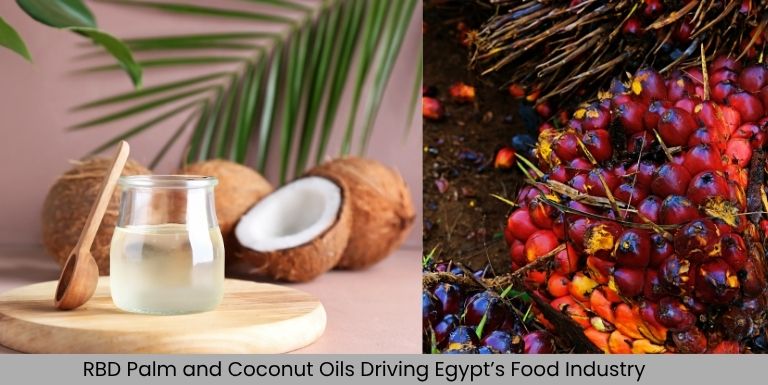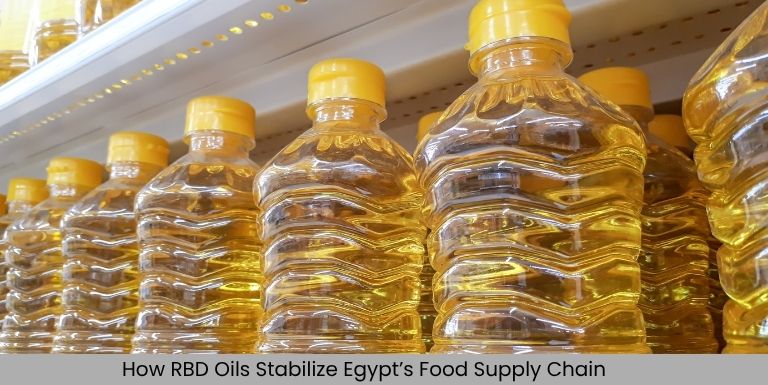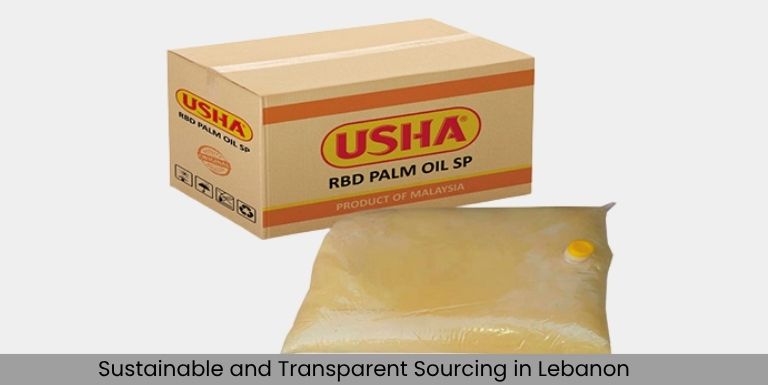Objective
The objective of this article is to explore why Egypt is increasingly turning to RBD Palm Oil and RBD Coconut Oil as key solutions to stabilize food prices, enhance domestic food production, and address supply chain challenges. The article will examine how these oils are shaping Egypt’s food industry, contributing to economic stability, and meeting the needs of its growing population. Additionally, it will highlight the role of a significant supplier, Usha Edible Oil, in supporting Egypt’s food security goals.
Introduction:
In recent years, Egypt has been grappling with several challenges in food production, inflation, and supply chain disruptions. With a population exceeding 100 million, the need for stable, affordable cooking oils has become a central concern. To address this issue, Egypt has increasingly adopted RBD Palm Oil (Refined, Bleached, and Deodorized Palm Oil) and RBD Coconut Oil as primary cooking oils to support domestic food production, curb inflation, and meet the rising demand for affordable food products. This article provides an in-depth analysis of how these oils are shaping Egypt’s food security, stabilizing prices, and reducing the nation’s dependence on volatile international markets.
Meeting Egypt’s Food Production Goals with RBD Palm and Coconut Oils: A Deep Dive
In a country like Egypt, where agriculture plays a vital role in the economy, food production is a key priority. However, Egypt faces a number of challenges related to domestic agricultural production, including limited arable land, water scarcity, and high production costs. These factors contribute to a reliance on imports for many of its foodstuffs, including oils.
Historically, Egypt imported a significant portion of its cooking oils, including sunflower and soybean oils. However, these oils have seen price volatility due to international market fluctuations, which is unsustainable for a country looking to achieve food security goals. In response, Egypt has been turning towards RBD Palm Oil and RBD Coconut Oil as viable alternatives.
RBD Palm Oil, derived from the fruit of the oil palm tree, is not only cheaper than some other oils but also highly stable, both in terms of flavor and shelf life. Its versatility in food processing, such as for frying, baking, and as an ingredient in many food products, has made it an attractive choice for Egypt’s food industry. RBD Coconut Oil, known for its high saturated fat content and long shelf life, has found its place in many culinary applications across the country, particularly for traditional and health-conscious consumers.
The government’s strategic decision to boost the use of these oils is part of a broader plan to ensure that Egypt can meet its domestic food production targets without overly relying on fluctuating international markets. By supporting local industries and promoting the adoption of more cost-effective oils, Egypt can meet its growing demand for cooking oils while simultaneously promoting domestic production.

How Egypt’s Adoption of RBD Palm and Coconut Oils is Shaping Domestic Food Production
The shift toward RBD Palm and Coconut Oils in Egypt is not just about price stability, but also about fostering a self-sufficient food production system. By incorporating these oils into the Egyptian food supply chain, the country has created new opportunities for local manufacturers, small and medium enterprises (SMEs), and agricultural sectors.
Egyptian food manufacturers now have access to a reliable and cost-effective raw material that supports consistent product quality. The oil refining industry has also seen growth, with more refineries set up to process palm and coconut oils, generating employment and contributing to the country’s economic growth. The use of RBD Palm and Coconut Oils has made it easier for manufacturers to produce a variety of processed foods, such as snacks, baked goods, margarine, and even cosmetics, at a lower cost.
Furthermore, Egypt has started cultivating its own oil palm plantations, particularly in regions with suitable climates, such as the Sinai Peninsula. This local cultivation of oil palm contributes to reducing dependence on foreign palm oil sources, bringing Egypt closer to self-sufficiency in vegetable oils. RBD Palm Oil, produced both locally and imported, helps meet local demand while fostering economic development in Egypt’s rural areas.
How RBD Palm and Coconut Oils Are Helping Egypt Combat Food Inflation
Food inflation has been a persistent issue in Egypt, driven by factors such as rising global commodity prices, currency devaluation, and disruptions in international supply chains. In particular, the price of cooking oils has been one of the major contributors to the inflationary pressures on Egyptian households. Since palm oil is one of the cheapest and most versatile vegetable oils on the market, RBD Palm Oil has become an essential part of the country’s strategy to curb food price hikes.
The price of RBD Palm Oil is generally more stable than other oils like sunflower or soybean oil, which are more vulnerable to weather conditions, geopolitical issues, and trade restrictions. By ensuring a stable supply of RBD Palm Oil, Egypt is able to offer affordable cooking oils to its population, which is crucial for maintaining social stability and reducing the economic burden on low-income households.
Similarly, RBD Coconut Oil has found its niche as a premium oil, offering a balance between health-conscious consumption and affordability. Its higher demand in health food sectors, as well as in premium food products, has allowed Egypt to cater to a broad range of consumer preferences without significantly increasing costs.
By increasing the domestic availability and production of these oils, Egypt has been able to insulate itself from some of the global price shocks, ensuring that local markets are not as exposed to the volatility that often affects other vegetable oils.
RBD Palm and Coconut Oils: Egypt’s Strategic Move for Affordable and Reliable Cooking Oils
Egypt’s strategic shift towards RBD Palm and Coconut Oils highlights the importance of affordable and reliable cooking oils for a growing population. The Egyptian government and local businesses have prioritized the availability of these oils due to their affordability and ability to be produced in large quantities.
The relatively low production cost of RBD Palm Oil is one of the main reasons it has been adopted so widely in Egypt. Palm oil is more energy-efficient to produce compared to other vegetable oils and can be processed in large quantities, making it an attractive option for Egypt’s food production sector. This affordability is key for the government’s goal of stabilizing the prices of essential food items for Egyptian families.
Meanwhile, RBD Coconut Oil serves a different market segment, with its perceived health benefits contributing to its popularity. As consumers in Egypt grow more health-conscious, coconut oil is increasingly being incorporated into diets as a cooking oil alternative.
Both oils complement each other in terms of consumer demand and offer a strategic solution to Egypt’s cooking oil needs, creating a diversified and resilient supply chain.

How RBD Palm and Coconut Oils Are Helping Egypt Navigate Global Supply Chain Disruptions
The COVID-19 pandemic, geopolitical tensions, and natural disasters have exposed vulnerabilities in global supply chains, affecting the availability and cost of many food products, including oils. Egypt, heavily reliant on imports, has been particularly susceptible to these disruptions. However, RBD Palm and Coconut Oils have provided a buffer during these challenging times.
Palm oil and coconut oil have strong and diverse supply chains, with multiple sources and production regions around the world. Egypt has worked to diversify its sources of these oils, including through direct imports from Usha Edible Oil, a prominent supplier of RBD Palm and Coconut Oils. By sourcing oils from suppliers in countries like UAE, Egypt has ensured a steady supply of these products despite disruptions in other parts of the world.
Moreover, RBD Palm Oil’s long shelf life and stability make it easier to store in large quantities, further enhancing Egypt’s resilience against supply chain shocks. By promoting the domestic availability of these oils, Egypt has bolstered its food security, making sure that it can continue to meet the needs of its population even in uncertain global conditions.

From Agriculture to Industry: The Multi-Sector Impact of RBD Palm and Coconut Oils in Egypt
The positive impact of RBD Palm and Coconut Oils in Egypt extends beyond the food production sector. As the country continues to explore the potential of these oils, both locally and in terms of exports, a multi-sector transformation is taking place. The increased demand for these oils has led to growth in industries ranging from agriculture to food processing to manufacturing.
The palm oil and coconut oil industries create jobs in various sectors. The agriculture sector benefits from increased demand for oil palm and coconut cultivation, and the food manufacturing sector benefits from a stable and affordable raw material. Additionally, businesses involved in oil refining and packaging, as well as those in retail and distribution, have experienced growth due to the rising demand for these products.
Conclusion: Usha Edible Oil’s Role in Egypt’s Palm and Coconut Oil Revolution
One of the key players facilitating Egypt’s access to high-quality RBD Palm and Coconut Oils is Usha Edible Oil, a reputable supplier based in UAE. Usha Edible Oil is a wholesale supplier of these oils, and its commitment to providing affordable and reliable oils to Egypt has been instrumental in meeting the country’s food production goals.
Usha Edible Oil’s wide distribution network ensures a steady supply of high-quality oils to Egyptian manufacturers, helping them to maintain competitive pricing and quality in their food products. Through its efforts, Usha has contributed significantly to Egypt’s efforts to reduce food inflation, ensure price stability, and navigate the challenges posed by global supply chain disruptions.
By fostering strong relationships with Egyptian businesses and providing high-quality palm and coconut oils at competitive prices, Usha Edible Oil is helping Egypt achieve its domestic food security goals while boosting local industries. With a continued focus on affordability, quality, and sustainability, Usha Edible Oil will remain a key partner in Egypt’s food production revolution.
FAQs
Why is Egypt focusing on RBD Palm and Coconut Oils?
Egypt is focusing on RBD Palm and Coconut Oils to ensure stable food prices, meet domestic food production goals, and reduce dependence on volatile international markets for cooking oils.
How does RBD Palm Oil help in combating food inflation?
RBD Palm Oil is more affordable and stable in price than other oils, making it a crucial component in keeping food prices down and combating food inflation in Egypt.
What are the benefits of using RBD Coconut Oil in Egypt?
RBD Coconut Oil is valued for its health benefits, long shelf life, and versatility in both traditional and modern Egyptian cuisine, making it a desirable alternative for consumers seeking healthier options.
How has Usha Edible Oil contributed to Egypt’s oil supply?
Usha Edible Oil, a prominent supplier from UAE, has played a key role in supplying high-quality RBD Palm and Coconut Oils to Egypt, ensuring consistent availability at affordable prices.
How does Egypt’s use of RBD Palm and Coconut Oils benefit the local economy?
The adoption of these oils has fostered local industries, created jobs in agriculture, refining, and manufacturing, and helped reduce the economic burden of food imports, boosting Egypt’s overall economic stability.
Author Bio

Sales Manager
Muhammad Usman, Sales Manager at Usha Edible Oil, combines years of industry experience with a strong focus on customer relationships. His expertise ensures that Usha Edible Oil delivers high-quality products, including RBD Palm Oil (CP6, CP8 and CP10), RBD Coconut Oil, Specialty Fats, Vegetable Shortening, Vegetable Ghee, and Margarine, to meet the diverse needs of global markets.
With a commitment to excellence, Muhammad continues to lead Usha Edible Oil in providing innovative and reliable vegetable oils, specialty fats, vegetable shortening, vegetable ghee, margarine export to various countries worldwide including Saudi Arabia, United Arab Emirates (UAE), Egypt, Syria, Qatar, Kuwait, Oman, Bahrain, Yemen, Iraq, Iran, Jordan, Lebanon, Palestine, Turkey, Sudan, solidifying its position as a trusted manufacturer, exporter, and wholesale supplier in the food industry.


